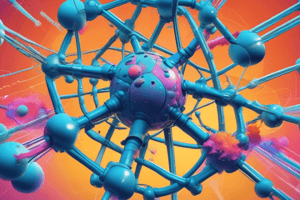Podcast
Questions and Answers
What happens to a proton during positron emission?
What happens to a proton during positron emission?
- It remains unchanged.
- It is emitted as an alpha particle.
- It is converted into an electron.
- It is converted into a neutron. (correct)
Which radionuclides are known for undergoing electron capture?
Which radionuclides are known for undergoing electron capture?
- 123I, 111In, 3H
- 125I, 123I, 201Tl, 67Ga, 111In (correct)
- 14C, 123I, 67Ga
- 125I, 201Tl, 67Ga
Which statement best describes the decay constant (λp) in the context of radioactive decay?
Which statement best describes the decay constant (λp) in the context of radioactive decay?
- It remains constant as the number of parent nuclei decreases.
- It is unique to each radioactive nuclide and can vary. (correct)
- It is equal to the activity at any time during the decay process.
- It represents the half-life of the parent nucleus.
What form of energy is typically released during electron capture?
What form of energy is typically released during electron capture?
How do alpha particles compare to positrons in terms of properties?
How do alpha particles compare to positrons in terms of properties?
Which type of radioactive decay is characterized by a decrease of 2 in atomic number and 4 in atomic mass?
Which type of radioactive decay is characterized by a decrease of 2 in atomic number and 4 in atomic mass?
What describes the primary characteristic of beta decay in terms of atomic number change?
What describes the primary characteristic of beta decay in terms of atomic number change?
In which of the following decay modes is no change in atomic mass observed?
In which of the following decay modes is no change in atomic mass observed?
The decay energy associated with radioactive decay is primarily a result of what?
The decay energy associated with radioactive decay is primarily a result of what?
Which decay mode is specifically associated with the emission of a positron?
Which decay mode is specifically associated with the emission of a positron?
Flashcards are hidden until you start studying
Study Notes
Basics of Radioactivity
- Radioactivity involves the disintegration of unstable atomic nuclei, emitting energy and transforming into new elements.
- Henri Becquerel discovered radioactive emissions from uranium compounds in 1896.
- Radioactive decay transitions from a parent nuclide to a daughter nuclide, with an energy difference linked to decay energy.
Types of Radioactive Decay
- Alpha Decay:
- Parent nuclei emit alpha particles (4,2α), resulting in a decrease of atomic mass (−4) and atomic number (−2).
- Beta Decay:
- Occurs in neutron-rich nuclides, emitting beta particles (β−) with a gain of one atomic number (+1); atomic mass remains constant.
- Positron Emission:
- Proton-rich nuclides emit positrons, converting a proton into a neutron; positrons annihilate with electrons, producing gamma radiation.
- Electron Capture:
- Nucleus absorbs an inner electron, converting a proton into a neutron and releasing gamma rays.
- Gamma Emission:
- Involves energetic transitions between excited states without changing atomic mass or number.
Characteristics of Radionuclides
- Alpha particles are monoenergetic; Beta particles exhibit an energy spectrum.
- Electron capture and positron emission produce characteristic X-rays.
- Radionuclides used in medicine include 125I, 123I, 201Tl, 67Ga, and 111In.
Activity and Decay Constants
- Activity (A(t)) represents the number of disintegrations per second for a radioactive substance.
- Activity is defined as A(t) = λN(t), where λ is the decay constant.
- Activity of parent nuclei decreases exponentially over time: A(t) = A(0)e^{-λt}.
Nuclide Transformation
- Positron and beta emissions, along with electron capture, change the original element to a new element.
- Alpha emissions are less common in medical applications but have therapeutic uses.
Summary of Decay Properties
- Radon nuclides demonstrate different decay mechanisms, including associated energy emissions and changes in atomic configuration.
Studying That Suits You
Use AI to generate personalized quizzes and flashcards to suit your learning preferences.





